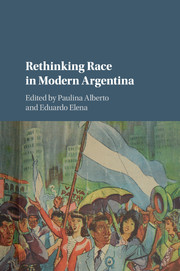Introduction: The shades of the nation
Published online by Cambridge University Press: 05 March 2016
Summary
Argentina suffers from what marketing experts would call an “image problem.” The country rarely fares well in the global media spotlight, where it is frequently trotted out as an example of spectacular political or economic failure. But seldom are the results of this scrutiny so unflattering as when issues of race and national identity come to the fore. As we write this Introduction, the 2014 World Cup provides the latest occasion for commentary. In a piece titled “Why So Many World Cup Fans Dislike Argentina,” The New York Times informed readers that “across Latin America, Argentina has the most people rooting against it” – not just because of the country's past successes on the field against its regional rivals but, more pointedly, because of “how some Argentines projected their perceptions of economic and cultural superiority in the region.” For the article's authors, the ugliest aspect of this ethnocentrism lies in “the ways in which some Argentines have traditionally viewed their nation, which received millions of European immigrants in the nineteenth and twentieth centuries: as a dominion of racial pre-eminence in the region.” A piece in the Huffington Post took a similar angle, asking “Why Are There No Black Men on Argentina's Roster?” Unlike other Latin American “rainbow nations […] conceived by the blend of American-Indians, Spaniards, and enslaved Africans,” Argentina's seemingly all-white roster confirmed, for the author of this piece, the country's exceptionally violent history of “purg[ing] their African roots from their socio-historical landscape and conscience,” and even of “ethnic cleansing” and “genocide,” in its eagerness to become “South America's whitest country.”
These journalistic assessments are all too familiar. The image of Argentina as a racial outlier in Latin America has become deeply engrained in popular and even academic discourses over the last century, and it shows few signs of fading. Whether celebrating the country's white and European character or condemning the discrimination and violence that sustained this image, commentators in Argentina and abroad have largely agreed in placing Argentina well outside of the narratives of racially mixed nationhood that characterize much of modern Latin America. The image of Argentina as a racial outlier makes for a good story, whether in the world of sports, in journalism, or in the classroom: it rings true and, as the World Cup coverage demonstrates, it often carries an important moral critique of racism and ethnocentrism.
- Type
- Chapter
- Information
- Rethinking Race in Modern Argentina , pp. 1 - 22Publisher: Cambridge University PressPrint publication year: 2016
- 25
- Cited by



